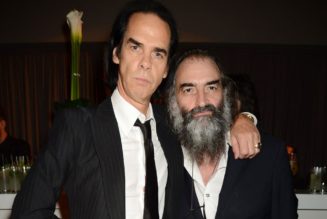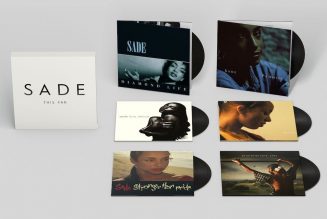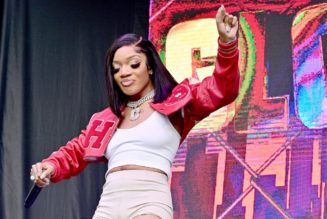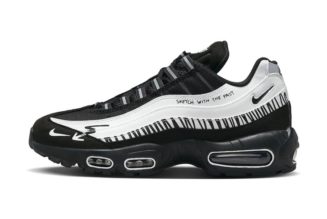It’s an image of contrast: a soldier with dragonfly wings rendered in bleeding graffiti sprays, the literal personification of its title. On the very cover artwork of Linkin Park‘s masterful, ground-moving debut Hybrid Theory, the entire concept is there: loud guitars with hip-hop beats, rap verses between screaming melodic choruses, a test of duality. A hybrid theory.
Supplemented with a street-art logo, the cover came to define the visual part of band’s breakthrough era as much as it echoed the sound of the music itself. Released in October 2000, Hybrid Theory became the best-selling album of 2001, capitalizing on the freight train of momentum the band had built from its early live shows and meticulous studio crafting. It’s since become one of the best-selling debuts of all time, stacked with several of the band’s signature songs, including the indelible “In the End.” A new Hybrid Theory 20th anniversary release, out today (October 9), unspools that history with unearthed demos and additional artwork from the era, including work done by Frank Maddocks, currently VP Creative Services at Warner Records, who worked with the band to finalize the art of the original release.
“I just know that at the time, stylistically, it just looked cool,” Maddocks tells MTV News about the design. “I think that there’s maybe a nod to kind of some Russian Constructivism in there. There’s maybe some Shepard Fairey sneaking through.”
That blend of styles came from conversations Maddocks and the label’s creative team had with the band, who had initially gone by the moniker Hybrid Theory before settling on Linkin Park. Maddocks said vocalist/producer Mike Shinoda and DJ Joe Hahn — both visual artists themselves — arrived to their first meeting with books and magazines ready to use as reference points for the album. “It was definitely rare,” he said. “Just kind of seeing that much thought and that much focus and that much intent from the band was really impressive.”
Maddocks said his visual work with Deftones, including the design for their seminal 2000 album White Pony, helped attract Linkin Park to wanting to work with his team. In the 20 years since, he’s continued to work with both bands, leading the charge for Deftones’s latest, Ohms, released last month.
To commemorate the new Hybrid Theory anniversary release, Maddocks broke down how they finalized the Hybrid Theory artwork together, how fan tattoos keep it alive (especially after singer Chester Bennington’s 2017 death), and what’s special about visiting the old material.
 Mick Hutson/Redferns
Mick Hutson/RedfernsMTV News: It seems the band knew how they wanted to represent themselves visually, but how did what would become the final artwork for Hybrid Theory come about, based on that conversation you had?
Frank Maddocks: I think through just only a few conversations, we kind of came up with this kind of a militant vibe. We were all really interested in Banksy at the time, and stenciling, and kind of this propaganda, kind of underground movement of work. I think that was something that we all really [clung] to, and so the idea of a stencil of some sort of a figure or a soldier or a militant vibe came across and then it was like, “OK, well what can we mix this with? How do we present the other side of what this is? Because on its own, that’s a really cool image, but we want to kind of do a double take. We want to have a juxtaposition of something kind of more thoughtful and emotional with this kind of more aggressive kind of icon.”
I literally have the sketchbooks of mine still where I’m writing notes down of possible things that it could be. At one point, I was writing butterfly wings, this and that. We liked the idea of these delicate dragonfly wings, and then I liked the idea of kind of almost making it look like someone had painted them on the street like you had the soldier initially, but then someone came along and kind of added to that piece. That was kind of the desired effect, was this kind of push and pull of images.
MTV News: What were your impressions of their music at the time?
Maddocks: I remember hearing the music for the first time and really being blown away and completely understanding how this music made sense for the time, how it made sense as them as a band amongst their peers. We all understood it. I gotta say, it was amazing hearing the music, and that album is still incredible. I don’t think any of us had any vision that obviously it would be as big as it is, so that was a pretty exciting thing to kind of watch the world kind of embrace this album. And then seeing them live… We all got invited down to see them play at the Whisky [a Go Go]. I think they were still called Hybrid Theory at the time. I mean, they were just flawless. It was unbelievable. It was almost like just listening to the record.
MTV News: The album became the best-selling album of 2001. How much did that success kind of influence what you ended up doing with them in the future on, say, 2003’s follow-up Meteora and 2004’s Collision Course [with Jay-Z] and beyond?
Maddocks: I think I’ve heard the band say this, too, but you’re not so much aware of how big something is until you’ve had some time to kind of process everything, kind of step away from it. Those records and everything that came with those records came so fast and there was so much work to do, that you never really had downtime to kind of say, oh, wow, isn’t this really special? And look — 100,000 people have this image tattooed on them, and that’s really cool.
I’d say that the success of the imagery only maybe gave me confidence in that I was headed in the right direction for the band and the fan base. When Mike gives me a few buzzwords to go off on or something, he knows that I’m going to riff on that and take it exponentially more than just the few things that he gave me just because we’ve shared so many years together.
So Meteora, that was — again, with the success of Hybrid Theory, we were afforded a lot more kind of real estate to create some really grandiose imagery, which was a lot of fun. Collision Course was a lot of fun, too, working with David Choe, who’s an illustrator who’s gone on to be an amazing fine artist.
MTV News: You brought up fans and fan tattoos. Such a huge part of the band’s fan base is really wearing their fandom in the same way that Chester’s flame tattoos on his wrists were such a huge part of him and his whole personality. Have you seen fan art and fan tattoos especially that have stuck out to you?
Maddocks: I have of many bands that I’ve worked with, and Linkin Park probably has the most. I mean, it’s funny because the art that I’ve made is on millions of records, obviously, and that’s so cool, but it kind of is the coolest thing ever when you see somebody with your art tattooed on them. That’s just like this amazing kind of tribute. Obviously, I know it’s because the music is so special to them and I’m happy to just lend a hand to that, but I got to think somewhere, if the art was really lame, it probably wouldn’t be tattooed. I still get so stoked on seeing this most simplest of things, like a tattoo or a sticker on someone’s car or a T-shirt.
MTV News: And along those same lines, I know the 20th anniversary edition has new art along with the unreleased material. Can you talk a little bit about what’s included?
Maddocks: It’s funny you bring up the tattoos because I actually did a few sections in the book that are dedicated to fan tattoos and all the different renditions of — mostly, it’s the album cover. There’s some fun stuff like that for the fans included in the book. There’s tons of never-before-seen or very seldom-seen photographs from that era. There’s some new artwork or some kind of revamped artwork from the day put in there. Everything is kind of seen through a new lens.
The way I kind of design things is that if we’re doing something 20 years later, even if I’m taking older designs and photographs, I still want to treat them in a new way. Even if you’ve seen some of this stuff, you’ve haven’t seen it in this way and collected in this setting. I think that it’s going to be really special for a lot of the fans. The guys were looking through the book the other day, the guys in the band, and some of them don’t even remember some of that stuff, the photos and all that stuff, so it’s a great time capsule for them. I think from the super fan to the casual fan, people will appreciate it.










